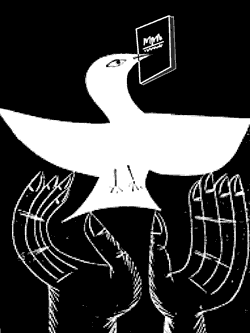 There are-of course-any number of books about war. Sun Tzu, General Von Clausewitz and all the rest sit in groaning rows about the bunks at military staff colleges around the world. They advise the aspiring officer on tactics and strategy, how the wars of yore were fought and lost, fought and won. Quotes are trundled out at exam time and the military man heads off to fight, his diploma in his hand, the words of wise war wizards of the past fading already as the shells howl overhead, and enlisted men die. This week, a suggested shelf of books on peace, or books that tell the truth about the war, and should urge us towards peace.
There are-of course-any number of books about war. Sun Tzu, General Von Clausewitz and all the rest sit in groaning rows about the bunks at military staff colleges around the world. They advise the aspiring officer on tactics and strategy, how the wars of yore were fought and lost, fought and won. Quotes are trundled out at exam time and the military man heads off to fight, his diploma in his hand, the words of wise war wizards of the past fading already as the shells howl overhead, and enlisted men die. This week, a suggested shelf of books on peace, or books that tell the truth about the war, and should urge us towards peace. No better place to start than the devastating Johnny Got His Gun by the American pacifist and leftist, Dalton Trumbo. At first, you think you're reading a mundane account of life in Middle America, as the main character Joe Bonham goes on picnics, remembers the fun he had as a child and ponders the taste of hamburgers. But no, Joe isn't living his highly typical life, he's dreaming about it on a hospital bed. Joe is a living corpse thanks to sickeningly severe injuries suffered in a bomb explosion in World War I. He has no arms, no legs and no face to speak of. He cannot hear or talk. This book sears your soul with its sparse horrors and Joe's ultimately futile effort to explain the evils of war by having a nurse trace letters on his bare chest, spelling words, forming sentences and ultimately being censored by the military authorities in the hospital. This book was banned in war-time America.

Journalist Micheal Herr's Dispatches is considered by many to be the definitive book on the Vietnam War. It's fiction and fact and diary and polemic twisted into skeins and woven with drug abuse and violence into a shattering experience that sickens and saddens by turns. It's characters ravage their brain cells with LSD and speed, and blast Vietnamese villagers into gobbets of blood and flesh. And these are not-you conclude-evil men who kill the civilians of the Mekong Delta, these are people who shouldn't be there, who should be ploughing, and courting their women and building businesses and living and dying amid domestic bliss. Instead, they're addled killing machines whose survival means only a lifetime plagued with guilt and drug flashbacks into their own personal killing fields.
Soviet Communism delivered few positive things but it did give us the remarkable Zinky Boys by Svetlana Alexievich. Afghanistan is the setting-Moscow's Vietnam. The title comes from the battered metal coffins shipped home from Kabul in their thousands, supposedly containing Soviet war dead, often empty because officers couldn't be bothered to collect fallen men from the battlefield. Alcohol was the drug of choice in Afghanistan, and many,many Soviet veterans just drank until they died, vomiting, body functions shutting down, eyes leaking blood. Often to get money to buy poisonous home-made vodka, the soldiers sold ammunition to their enemies, bullets that might just kill them the following day as they wallowed, drunk, on the front line.
Anyone who hasn't read Majusi Ibuse's Black Rain doesn't deserve to have a position on nuclear weapons. It's about Hiroshima, Japan, and takes place on the sixth of August, 1945. Ordinary people in a middle-sized city go about their business and watch an American atomic bomb detonate about a kilometre above the centre of town. A firestorm, an oozing jellyfish of flame and fragments of buildings, rages beneath the blast. Blind survivors, their eyes imploded by pressure and the flash of light, rush about, unaware that their skin is coming off in sheets. People stream from every exit point, not knowing what has happened to them, and die along the roads. Read this and feel sick to your stomach at what we do to each other in the name of politics, strategy and war. Read this and rage against the machine. But read it.
Finally, something drab and scientific. It's a report by Indian physicist MV Ramana called Bombing Bombay and it's his attempt to show how even a limited nuclear explosion above India's commercial capital would cause untold, long-lasting, unacceptable harm. Through page and page of cold, technical prose, graphs and statistics, Ramana tells us that at least 800,000 would die within hours if a Hiroshima-sized bomb were detonated in Bombay. Never mind, he says, the days, weeks, months and years of aftermath where food shortages, riots, cancer and radiation sickness will claim many, many more. It's not art. It's reality.
There you have it. The dove's book shelf. It's time we all did a lot more reading, and a lot less war-mongering.



